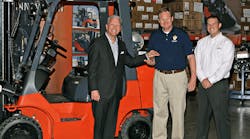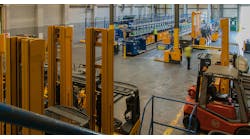Since my last blog blasting the National Science Foundation about the “Super Supply Chain Technician” they want to create, I met two people with a more down-to-earth vision of how the NSF might actually achieve their goal. The reason the idea of a steady supply of multi-skilled supply chain specialist seems more reasonable to me now is these gentlemen are busy building the supply chain that could produce them.
Meet David Tucker and James Dolan. David is vice president for workplace development/community services at Vincennes University, and James is the director of logistics at that school’s Logistics Training and Education Center, located in Plainfield, Ind. That Center is composed of 30,000 square feet of classrooms, cutting edge material handling equipment, warehousing and lab space. I met them there this week as they accepted the donation of two lift truck engines, an internal combustion (I.C.) lift truck, and all the hands-on training their instructors would need to capture the imagination of students going through their program.
The donation came from a generous neighbor: Toyota Industrial Equipment Mfg. Inc. (TIEM), whose lift truck manufacturing plant is nearby in Columbus, Ind. Jeff Rufener, president of Toyota Material Handling USA, made the official presentation at a ceremony held in front of journalists from the business media.
“With the Vincennes University Center located so close to our manufacturing plant, it is a natural extension for Toyota to contribute its resources to support the University’s material handling and warehouse training programs,” he said. But after the ceremony, Rufener told me this kind of donation is actually in industry’s best interest.
“Most of the logistics programs I’ve heard of are at the college level—four-year logistics programs, so I thought it terrific Vincennes is offering technical certificates and two year associates degrees,” he said. “They told us part of what they’re teaching people to do is show up every day. Young people don’t always have that fundamental notion.
“On top of that, we at Toyota have been talking for years about technician availability,” he continued. “It’s a very specialized skill. In connection to this program we’re talking about it even more because there’s a general set of skills important to our industry. I told Dave and James to keep coming to us so we can keep the dialog going. As long as we keep seeing what each other are doing we’ll find additional ways to collaborate.”
Of course Dolan will tell you his program isn’t alone in what it hopes to accomplish, and when I mentioned the critical blog I wrote about the lofty expectations the NSF had in producing technicians that could install, operate, support, upgrade and maintain the hardware, software, automated equipment and systems supporting their supply chain, he smiled—but he didn’t laugh.
“We are one of more than 30 supply chain programs around the country doing something similar but at different levels,” he said. “All of us are designing programs for the industry sector we’re in. There are programs on the east coast focusing on intermodal and ports and some in the central part of the country focusing on rail and transportation. In fact, we hosted a summer camp on all of these programs, sharing and collaborating on what the industry as a whole needs.”
What those programs represent is a supply chain of talent that starts with building a student’s appreciation, then heads into skills development and eventually to work experience. This isn’t a one-stop-shop proposition. It’s career-long. And while Dolan respects what the NSF wants to accomplish, he sees his program, and those of his colleagues across the country, as feeders to what the NSF is doing with Norco College in Norco, Calif.
“The NSF is on the mark as far as wanting to supply the skills industry says it needs,” Dolan says. “But what we’re hearing from our industry partners is, while that’s what they need, we need to focus on what we have to work with. That means building a pool of candidates to feed into it.”
David Tucker adds that students don’t approach logistics on as grand a scale as the NSF envisions.
“We deal with students and families on a much more practical and fundamental level,” he said. “The folks who run that NSF funded program aren’t really dealing with those concerns. They’re dealing with, ‘What will this industry look like and what skills do we need to be building,’ which is a much more theoretical standpoint. If we were building a program like that here at Vincennes we wouldn’t have any students. Sure all these warehouses and DCs would love to have people with degrees in logistics, but they can’t afford to pay such people and right now they don’t demand those skills. We have to start at a fundamental level and build from the basics.”
Toyota’s gift of equipment and train-the-trainer services fit that bill quite nicely. Tucker says there are already job openings waiting for some of his students, and that’s because they’re being immersed in the kinds of skills logistics employers need today. Vincennes has a fully functioning warehouse which receives books from suppliers. Program participants receive those shipments into inventory via WMS and also fulfill orders placed on the outbound—picking orders and shipping them out.
Being part of such a logistics talent supply chain is more likely to get young people thinking seriously and strategically about a life in logistics. It’s a field where everyone, no matter how many years they have under their utility belt, should be proud to wear that S—standing for Student.




